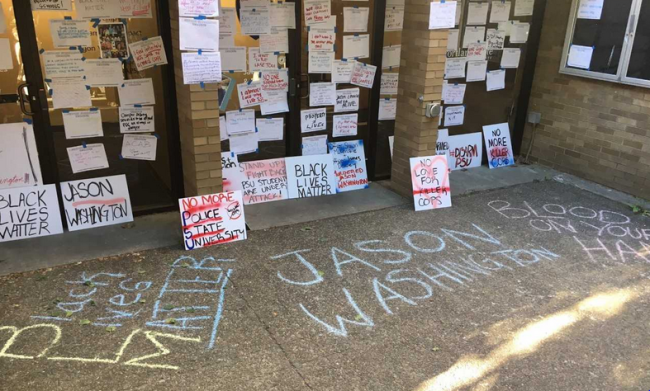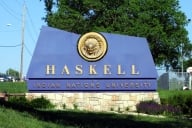You have /5 articles left.
Sign up for a free account or log in.

Portland State University Student Union
Protesters took to the streets of Portland, Ore., Sunday to participate in the Disarm PSU: No More Killer Cops rally organized by the Portland State University student union after Jason Washington, 45, was shot and killed by Portland State campus police on Friday outside of the Cheerful Tortoise, a campus sports bar.
Washington was a Navy veteran and U.S. postal worker. Witnesses told CBS News that he was attempting to break up a fight between two other men and was shot while moving to pick up a handgun that had fallen from his holster. Washington had a concealed-carry permit for the weapon.
Shawn McKenzie and James Dewey, the Portland State officers involved in the shooting, have been placed on administrative leave while the Portland Police Bureau investigates the situation. In response the protest, Portland State issued the following statement:
“Portland State University supports the right of individuals and groups to organize and participate in peaceful protests. PSU President Rahmat Shoureshi said Friday that he recognizes there are questions and concerns about the fatal officer-involved shooting, and the university is fully cooperating with the Portland Police Bureau's investigation. In addition, President Shoureshi has requested the Campus Public Safety Chief to conduct a thorough internal assessment and evaluation of the incident as well as our policies and procedures. This is the first officer-involved shooting at Portland State.”
The #DisarmPSU movement has existed since the Portland State Board of Trustees voted in favor of a sworn armed campus police force in December 2014. Armed officers were present on campus beginning in the fall of 2015. Prior to the decision, Portland State was the only public university in the United States with more than 15,000 students that did not have sworn police officers.
The decision was made despite opposition from many students and faculty members. A survey issued by the Associated Students of PSU in November 2013 revealed that, of the 1,200 students who responded, 58 percent were opposed to the creation of a sworn police force, 37 percent supported it and 4 percent were neutral. The American Association of University Professors polled their Portland State members on the same issue, and of the 400 faculty respondents, 256 were opposed and 119 were in favor.
A statement issued by the Portland State student union explained that the group had opposed the arming of campus police since the university first considered it in 2012, and that many faculty members and students were worried that the decision would one day result in deadly violence.
"We called to #DisarmPSU because we know that policing in this country is built atop an explicitly racist foundation, and in a city with a laundry list of people of color and disabled people who have been murdered by police, we saw no need to perpetuate this oppression on our campus," the statement read in part. At the rally, speakers said that Washington was a black man and the two officers appeared to be white.
Students, faculty members and local residents took to Twitter with the hashtag #DisarmPSU to share their thoughts.
A fact sheet on the Portland State website notes that certain situations, such as serving search warrants and performing off-campus welfare checks, require the possession of firearms, and that Tasers and Mace are "ineffective in a dire situation involving an active shooter," though campus officers do also have access to Tasers and pepper spray.
According to 2012 data from the United States Bureau of Justice Statistics, 75 percent of college and universities with an enrollment of 2,500 have armed campus police officers. The vast majority -- 92 percent -- of public universities have sworn and armed police officers, whereas only 38 percent of private colleges do.
"The number of colleges and universities that have made a decision to arm their police forces has increased over the past decade," said Paul Ominsky, president of the International Association of Campus Law Enforcement Administrators. "These are local decisions made by campus leaders based on state governing laws and an evaluation of their specific needs for community safety. Decisions like these are not made lightly."
Ominsky also said that the use of deadly force varies state by state, but that the standards are the same for sworn campus and municipal police.
Christopher Broderick, a spokesman for Portland State, said that Shoureshi briefed the Board of Trustees on Friday, but the board has not formally met.








